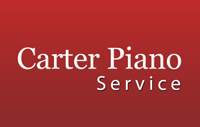Do you tune by ear or use electronics?
I have always tuned by ear - it's always made the most sense to me. Sophisticated Electronic tuners, whether stand alone boxes like Sanderson Accutuners or computer based, are good at making calculations determining the theoretically best way to tune any particular piano, but they don't do anything that an experienced aural tuner can't do. We also can, with a series of test intervals, determine the accuracy of a pitch to 1/10 cent - or 1,000th of a semi-tone - and determine the proper stretch to compensate for scaling inharmonicity (which is present in varying amounts in every piano). What we can also do is hear the tuning the same way the player hears it - musically, not just mathmatically. Electronic users will argue that they too can listen to the tuning as well as aural tuners and it's true that some can do a very nice job - I have just never wanted to rely on a machine to do what my ears should be doing.
Experience plays a large part in tuning ability - it's relatively easy to determine the best temperament and subsequent tuning for each piano - the challenge for me and other conscientious technicians is tuning stability, or manipulating the tuning pins and strings in such a way that they resist going out of tune as much as possible due to heavy playing or changing humidity. This is a process of balancing the tensions in various string segments when changing the pitch of a string, and leaving the tuning pin in a position where it's least likely to move given hard playing (vibration overcoming static friction). These are very subtle manipulations that make all the difference in the finished tuning - it doesn't matter how accurate the notes are if they go out of tune as they're being played. These skills are crucial in concert work - having a piano go out of tune during a recital is a tuners nightmare and I've refined my technique over the years to avoid that scenario ever happening (knock on wood). Of course there is much more to piano work than tuning - an experienced technician should also be expert at action regulation and voicing - not to mention all types of repair work. Also diagnosis of any problems with playability or tone. Experience with all aspects of rebuilding doesn't hurt either, in my opinion, as shop work gives me perspective on piano design and construction and allows me some welcome respite from the rigors and stress of tuning more than a few days a week.



